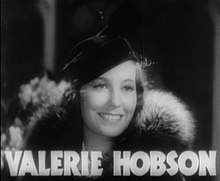Valerie Hobson
| Valerie Hobson | |
|---|---|
 from the trailer for Bride of Frankenstein | |
| Born |
Babette Valerie Louise Hobson 14 April 1917 Larne, County Antrim, Ireland |
| Died |
13 November 1998 (aged 81) Westminster, London, England |
| Years active | 1932–1954 |
| Title | The Lady Profumo |
| Spouse(s) |
Anthony Havelock-Allan (1939–1952; divorced) John Profumo (1954–1998; her death) |
| Children | 3, including David Profumo |
Valerie Hobson, Baroness Profumo (Italy) (born Babette Valerie Louise Hobson, 14 April 1917 – 13 November 1998),[1] was an Irish-born actress who appeared in a number of films during the 1930s, 1940s and 1950s. Her second husband was John, 5th Baron Profumo, a government minister who became the subject of a sensational sex scandal in 1963.
Early years
Hobson was born in Larne, County Antrim, in Ulster. Her father was a captain in the Royal Navy.[2]
Before she was 11 years old, Hobson had begun to study acting and dancing at the Royal Academy of Dramatic Arts.[3]
Life and career
In 1935, still in her teens, she appeared as Baroness Frankenstein in Bride of Frankenstein with Boris Karloff and Colin Clive. She played opposite Henry Hull that same year in Werewolf of London, the first Hollywood werewolf film. The latter half of the 1940s saw Hobson in perhaps her two most memorable roles: as the adult Estella in David Lean's adaptation of Great Expectations (1946), and as the refined and virtuous Edith D'Ascoyne in the black comedy Kind Hearts and Coronets (1949).
In 1952 she divorced her first husband, film producer Sir Anthony Havelock-Allan (1904–2003). In 1954, she married Brigadier John Profumo (1915–2006), an MP, giving up acting shortly afterwards. Profumo was a prominent politician of Italian descent. Hobson's last starring role was in the original London production of Rodgers and Hammerstein's musical play The King and I, which opened at the Theatre Royal, Drury Lane, on 8 October 1953. She played Mrs. Anna Leonowens opposite Herbert Lom's King. The show ran for 926 performances.[4]
After Profumo's ministerial career ended in disgrace in 1963, following revelations he had lied to the House of Commons about his affair with Christine Keeler, Hobson stood by him; and they worked together for charity for the remainder of her life, though she did miss their more public personas.[5]
Hobson's eldest son, Simon Anthony Clerveaux Havelock-Allan, was born in May 1944 with Down syndrome. Her middle child, Mark Havelock-Allan, was born on 4 April 1951 and became a judge. Her youngest child is the author David Profumo (b. 16 October 1955), who wrote Bringing the House Down: A Family Memoir (2006) about the scandal. In it, he writes his parents told him nothing of the scandal and that he learned of it from another boy at school.[6]
After her death, Hobson's body was cremated in accordance with her wishes. Half her ashes were interred in the family vault in Hersham. The rest were scattered on 1 January 1999 by her sons David Profumo and Mark Havelock-Allan, near the family's farm in Scotland.[7]
Hobson was portrayed by Deborah Grant in the film Scandal (1989), and by Joanna Riding in Andrew Lloyd Webber's stage musical Stephen Ward the Musical, which opened at the Aldwych Theatre on 19 December 2013.
Filmography
- His Lordship (1932)
- For Love of You (1933)
- Eyes of Fate (1933)
- The Path of Glory (1934)
- Two Hearts in Waltz Time (1934)
- Badger's Green (1934)
- Strange Wives (1934)
- The Man Who Reclaimed His Head (1934)
- Life Returns (1935)
- Rendezvous at Midnight (1935)
- Oh, What a Night (1935)
- The Mystery of Edwin Drood (1935)
- Bride of Frankenstein (1935)
- Werewolf of London (1935)
- Chinatown Squad (1935)
- The Great Impersonation (1935)
- Secret of Stamboul (1936)
- August Weekend (1936)
- Tugboat Princess (1936)
- No Escape (1936)
- Jump for Glory (1937)
- The Drum (1938)
- This Man Is News (1938)
- Q Planes (1939)
- The Silent Battle (1939)
- The Spy in Black (1939)
- This Man in Paris (1939)
- Contraband (1940)
- Atlantic Ferry (1941)
- Unpublished Story (1942)
- The Adventures of Tartu aka Sabotage Agent (1943)
- The Years Between (1946)
- Great Expectations (1946) (Hobson had also acted in the 1934 version, in the role of Biddy, but her scenes were cut.)
- The Small Voice (1947)
- Blanche Fury (1948)
- Kind Hearts and Coronets (1949)
- Train of Events (1949)
- The Interrupted Journey (1949)
- The Rocking Horse Winner (1950)
- The Card (1952)
- Who Goes There! (1952)
- Meet Me Tonight (1952)
- The Voice of Merrill (1952)
- Background (1953)
- Knave of Hearts (1954)
References
- ↑ Vallance, Tom (16 November 1998). "Obituary: Valerie Hobson". The Independent.
- ↑ Barker, Dennis (16 November 1998). "Star of screen and scandal". The Guardian. England, London. p. 16. Retrieved April 25, 2018 – via Newspapers.com.

- ↑ Banville, John (October 14, 2006). "A family affair". The Irish Times. Archived from the original on 26 April 2018. Retrieved 26 April 2018.
- ↑ Stanley Green, Encyclopedia of the Musical Theatre (New York, 1976: Dodd, Mead & Company, Cambridge, Massachusetts: DaCapo Press, 1980), p. 233.
- ↑ Grice, Elizabeth (2 September 2006). "Son breaks family's 40-year silence on scandal of the Profumo Affair". The Telegraph. London, UK.
- ↑ "Dingy Quadrilaterals". London Review of Books. 19 October 2006.
- ↑ Profumo, David (4 September 2006). "Even if the heart bleeds almost to death, passionate love is worth it". The Daily Telegraph. London.
External links
| Wikimedia Commons has media related to Valerie Hobson. |